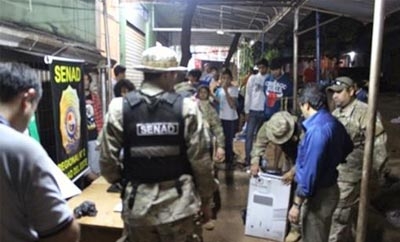Authorities in Paraguay have discovered the country’s first reported ecstacy laboratory, in a case that highlights both the increasing popularity of synthetic drugs in the region and the growing influence of Brazil’s organized crime in the country.
The laboratory — which was also being used to process cocaine — was discovered in Ciudad del Este by Paraguay’s Anti-Narcotics Police, reported EFE. It had allegedly been operating for two months and delivered drugs to Brazil, the United States and Europe. The laboratory had the capacity to produce 1,000 ecstasy pills per hour, an amount worth $30,000 in Paraguay.
SEE ALSO: Coverage of Paraguay
Two Brazilian chemists, who had previously been arrested in a drug processing lab in their home country, were detained alongside two Paraguayans. Police seized 37kg of cocaine, nearly 3,300 ecstasy pills and drug processing equipment.
In early April, Paraguay’s National Anti-drugs Secretariat (SENAD) announced the country had become a “distribution center” for synthetic drugs destined for Brazil and Argentina. SENAD said the activity was based in the Triple Frontier region where Paraguay, Brazil and Argentina meet.
InSight Crime Analysis
As well as being the region’s number one marijuana producer, Paraguay’s shared borders with Argentina and Brazil — both significant drug markets and export points — and coca producer Bolivia makes it an important transit nation for cocaine, with signs processing of the drug may also be increasing. At the heart of this dynamic sits the Triple Frontier — centered on Ciudad del Este — where porous borders make interdiction difficult and invite incursions from foreign criminal actors.
Among the many foreign groups known to operate in Paraguay, Brazilian organized crime is particularly prominent, with the Rio de Janeiro-based Red Command reported in 2013 to be shipping one ton of cocaine out of the country every month. Later that year a cell of the Sao Paulo-based First Capital Command (PCC) was detained in the eastern border city of Pedro Juan Caballero. Much of the Brazilian criminal activity is based in the eastern border area between the city and Ciudad del Este, with a spate of killings in and around Pedro Juan Caballero during the first months of 2014 linked to a war between Brazilian criminal groups.
The arrest of two Brazilian chemists with a prior history for drug production and the proximity of the laboratory to the Triple Frontier suggests the two men may have been brought in by one or another Brazilian criminal group dedicated to supplying the growing demand for synthetic drugs in both Argentina and Brazil. In another sign of the growth of South American synthetic drug production, Argentina discovered its first reported ecstacy lab in late-2013.

